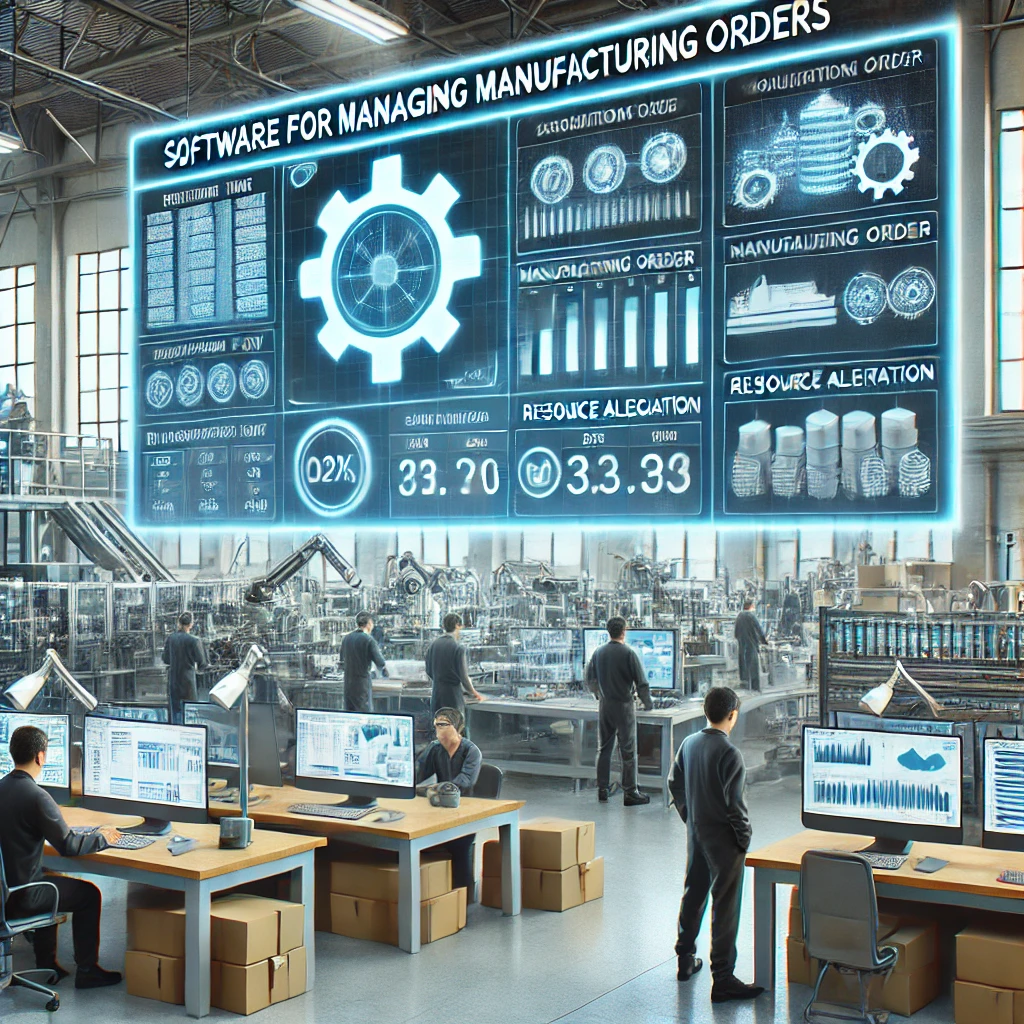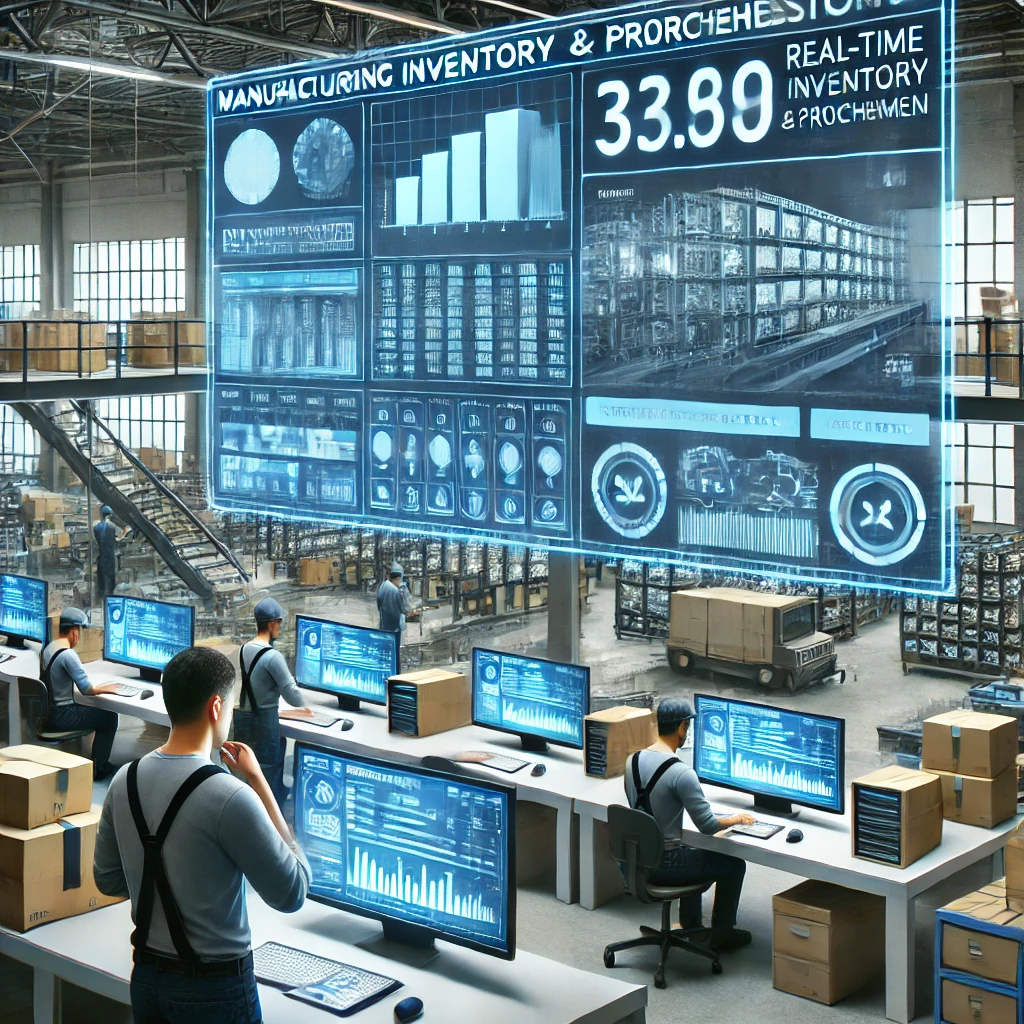In today’s fast-evolving manufacturing landscape, keeping track of multiple operations—from procurement to production, quality control, and financial management—can be challenging. This is where Manufacturing ERP Modules come into play. These specialized modules are designed to streamline manufacturing processes by integrating every aspect of the business into one unified system, offering real-time visibility and control.
In this article, we’ll explore the core Manufacturing ERP Modules that help manufacturers manage everything from inventory and production to quality control and compliance.

What Are Manufacturing ERP Modules?
Manufacturing ERP Modules are components within an ERP (Enterprise Resource Planning) system tailored to address the unique needs of the manufacturing sector. Each module focuses on a specific area of manufacturing operations and integrates seamlessly with other modules to provide a holistic view of the business.
The key benefit of ERP modules is that they allow manufacturers to automate and optimize various processes, including production planning, material procurement, inventory management, and more. With these modules, manufacturers can gain better control over their operations, reduce costs, and improve productivity.
Core Manufacturing ERP Modules
Here are the core Manufacturing ERP Modules that drive efficiency in manufacturing operations:
1. Production Planning and Scheduling Module
This module allows manufacturers to create detailed production plans, manage resources, and schedule jobs effectively. It ensures that materials and labor are available when needed, helping to prevent delays and meet production deadlines.
2. Inventory Management Module
The Inventory Management Module provides real-time visibility into stock levels, materials on order, and work-in-progress items. It helps manufacturers optimize inventory, reduce overstocking, and minimize stockouts.
3. Material Requirements Planning (MRP) Module
This module calculates the materials needed for production based on existing stock, sales orders, and production schedules. It helps manufacturers avoid material shortages and ensure that the right materials are available at the right time.
4. Supply Chain Management Module
The Supply Chain Management (SCM) Module manages supplier relationships, procurement, and logistics. It tracks supplier performance, monitors the delivery of materials, and ensures smooth supply chain operations.
5. Quality Control Module
This module tracks quality metrics throughout the production process, helping manufacturers maintain high standards and reduce defects. It also ensures that products meet compliance requirements.
6. Financial Management Module
The Financial Management Module integrates with production and inventory systems to provide real-time financial data. It tracks costs, revenues, and budgets, helping manufacturers maintain profitability and control spending.
7. Human Resources (HR) and Workforce Management Module
This module helps manage labor allocation, track employee productivity, and ensure compliance with labor laws. It integrates with other modules to allocate labor effectively based on production demands.
8. Maintenance and Equipment Management Module
The Maintenance Module ensures that machinery and equipment are maintained regularly to prevent breakdowns and minimize downtime. It tracks maintenance schedules, spare parts, and repair history.
Why Manufacturers Need ERP Modules
Manufacturers face numerous challenges, including managing complex supply chains, ensuring product quality, and controlling production costs. Manufacturing ERP Modules address these challenges by automating processes and providing real-time data that improves decision-making. Here’s why manufacturers need these modules:
1. Increased Efficiency
By automating repetitive tasks and integrating data across departments, ERP modules reduce manual errors and increase efficiency. This leads to faster production times and more accurate resource management.
2. Improved Decision-Making
With real-time data on production, inventory, and finances, manufacturers can make informed decisions quickly. ERP modules provide the insights needed to adjust production schedules, control costs, and improve profitability.
3. Better Resource Management
ERP modules help manufacturers optimize the use of materials, labor, and machinery. This leads to reduced waste, lower costs, and improved productivity.
4. Enhanced Compliance
Manufacturers must comply with various industry regulations and standards. ERP modules, especially the quality control and financial management modules, ensure that manufacturers maintain compliance and avoid costly penalties.
How Syncratech’s ERP Modules Can Benefit Your Manufacturing Operations
At Syncratech, we understand the complexities of running a manufacturing business. Our Manufacturing ERP Modules are designed to help manufacturers streamline operations, improve productivity, and reduce costs.
Our tailored ERP solutions offer:
- Real-time production tracking to improve efficiency.
- Integrated inventory management to prevent stockouts and overstocking.
- Financial control tools to monitor costs and improve profitability.
- Quality control features to ensure compliance and reduce defects.
By implementing Manufacturing ERP Modules, manufacturers can gain better control over their operations and drive efficiency at every level. Visit our homepage to learn more about how our ERP solutions can support your business.
Benefits of Manufacturing ERP Modules
Implementing Manufacturing ERP Modules provides several benefits that can transform your manufacturing operations:
1. Streamlined Operations
ERP modules integrate all aspects of manufacturing into one system, eliminating data silos and ensuring that operations run smoothly from procurement to production.
2. Cost Control
By optimizing material use, labor, and machinery, ERP modules help manufacturers control costs and improve profitability.
3. Improved Product Quality
With real-time quality tracking, manufacturers can catch defects early and make corrections, ensuring that only high-quality products reach the market.
4. Better Compliance
ERP modules help manufacturers comply with industry regulations by tracking and reporting on quality, financial, and operational data.
FAQs About Manufacturing ERP Modules
1. How do Manufacturing ERP Modules improve efficiency?
ERP modules automate production, inventory, and financial management tasks, reducing manual errors and increasing operational efficiency.
2. Can Manufacturing ERP Modules integrate with existing systems?
Yes, most ERP systems are designed to integrate with other software, ensuring that all business functions work together seamlessly.
3. What size businesses benefit from Manufacturing ERP Modules?
Manufacturing ERP Modules are scalable and can benefit businesses of all sizes, from small manufacturers to large enterprises.
4. How do ERP modules help with compliance?
ERP modules track and report on quality control, financial, and operational data, ensuring that manufacturers meet industry regulations and standards.
Final Thoughts
For manufacturers looking to streamline operations, improve productivity, and reduce costs, Manufacturing ERP Modules offer the perfect solution. By integrating core manufacturing functions into a single system, ERP modules help manufacturers gain real-time visibility, optimize resources, and improve decision-making.
At Syncratech, we offer customized ERP solutions that include a wide range of Manufacturing ERP Modules. Visit our homepage to learn more about how our software can benefit your manufacturing operations.
Image Generation
Image Description: A modern manufacturing facility with various digital screens displaying real-time data from different ERP modules, such as production schedules, inventory levels, and quality control metrics. Workers are monitoring the data and making real-time adjustments, illustrating the integration of multiple Manufacturing ERP Modules to streamline operations.
Category: ERP Solutions for Manufacturing
Alt Text: “A modern manufacturing facility with digital screens showing real-time data from ERP modules like production schedules, inventory levels, and quality control metrics, illustrating how Manufacturing ERP Modules streamline operations.



